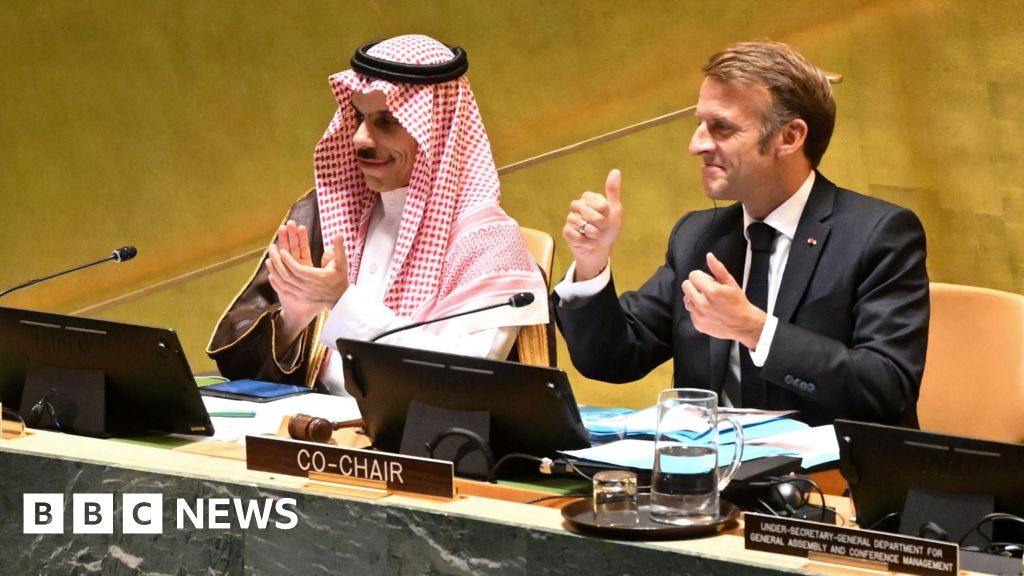European Powers Recognize Palestinian State Amid US Opposition, Deepening Diplomatic Rift
European Powers Recognize Palestinian State Amid US Opposition, Deepening Diplomatic Rift

In a historic diplomatic move, Britain and France have formally recognized a state of Palestine at the United Nations, a decision made just hours ago that marks a significant moment in the century-old Israeli-Palestinian conflict. This unprecedented step by major European powers is seen as a diplomatic gamble, underscoring their belief that the current crisis in Gaza necessitates such a bold intervention to keep the two-state solution viable.
French President Emmanuel Macron, co-chairing a UN conference on the Question of Palestine in New York, asserted that “right must prevail over might,” condemning both Israel and Hamas. This coordinated effort, also backed by Saudi sponsorship, aims to safeguard the international formula for peace, which many view as the sole path to a fair future for both societies. UN Secretary-General António Guterres warned against a ‘one-state’ solution, which he described as Israeli domination and the subjugation of Palestinians, reiterating that nothing justifies collective punishment or ethnic cleansing.
Israel has reacted with fury, viewing the UN conference and the European recognition as a reward for Hamas following its October 7, 2023, attack and hostage-taking. Some Israeli ministers are advocating for a response that includes the annexation of parts of the occupied West Bank, effectively ruling out a future Palestinian state. Prime Minister Benjamin Netanyahu’s coalition, which includes far-right elements openly advocating for Palestinian expulsion and settlement expansion, is actively working against a two-state solution.
The Trump administration continues to back its Israeli ally, rejecting the European initiative and imposing sanctions on Palestinian Authority President Mahmoud Abbas, who was barred from attending the conference in person. This marks the deepest ever split between Washington and its European allies regarding the Middle East conflict. Despite this, European leaders feel compelled to act given the deteriorating situation on the ground: Israel’s deployment of a third army division into Gaza City, ongoing Palestinian casualties, Hamas retaining hostages, and unchecked Israeli settlement expansion and settler violence in the West Bank, nearly two years after the October 7 attacks.
Macron’s strategy is designed to demonstrate that diplomacy offers a viable alternative, aiming for an immediate end to the war in Gaza followed by a long-term two-state solution. The European nations argue that Israel’s current strategy has failed, leading to increased civilian suffering and endangering remaining hostages. Crucially, the UN conference was also led by Saudi Arabia and supported by the Arab League, signaling a potential new leverage point over Hamas, with key Arab countries now calling for the group to disarm and hand weapons to the PA, effectively denying it a future leadership role. This process, Macron believes, incentivizes Israel and keeps open the door to normalization with Saudi Arabia, a long-desired goal for both Netanyahu and Trump.
However, this decision to recognize a Palestinian state against Washington’s wishes represents a significant diplomatic risk. While Macron seeks to assume a global leadership role, the absence of US leadership in this effort diminishes the meaningful pressure that only Washington can exert on all parties. With Trump reportedly traveling to the UN for separate meetings with Arab leaders, the lack of coordination between key international players only adds to the sense of dysfunction, further complicated by Qatar’s refusal to mediate again after recent Israeli actions against Hamas leaders on its soil.
Disclaimer: This content is aggregated from public sources online. Please verify information independently. If you believe your rights have been infringed, contact us for removal.